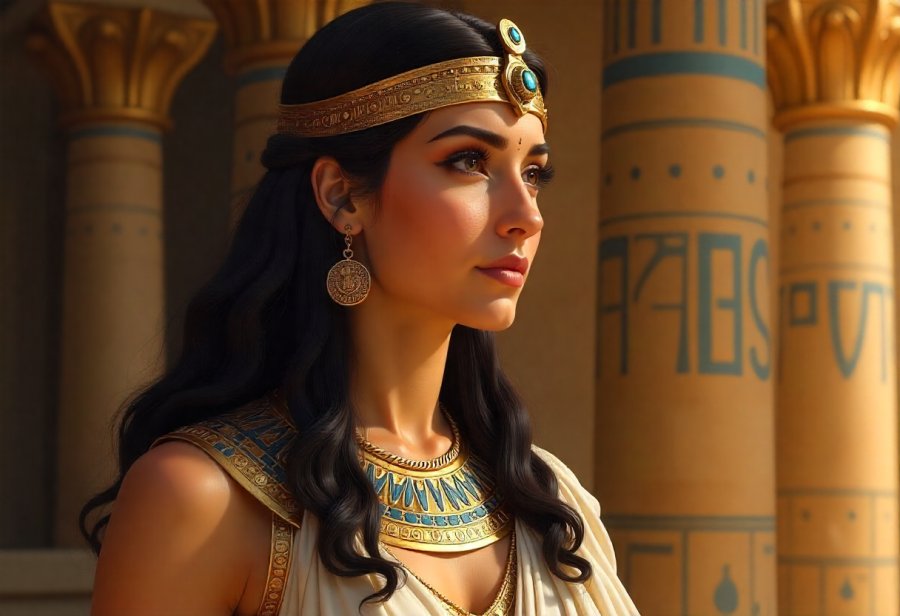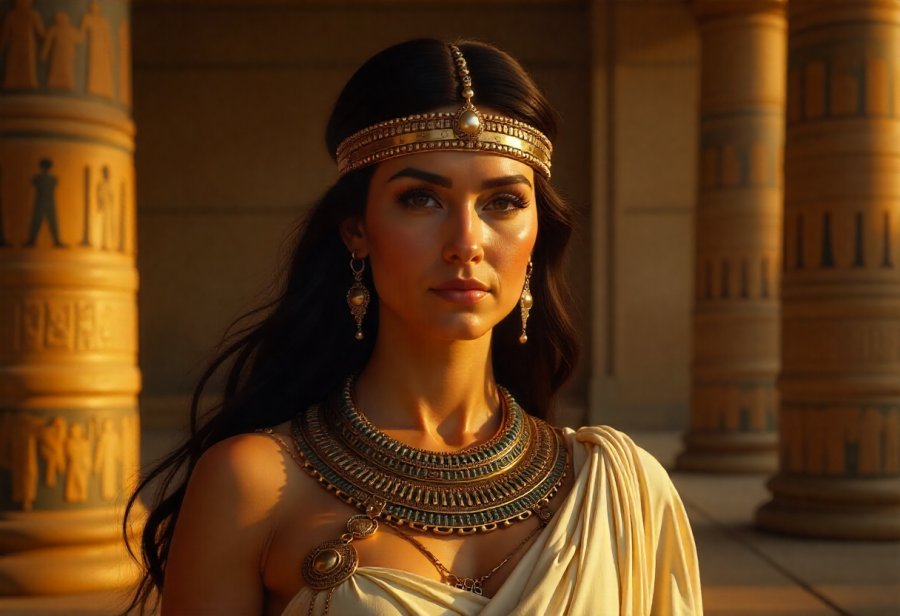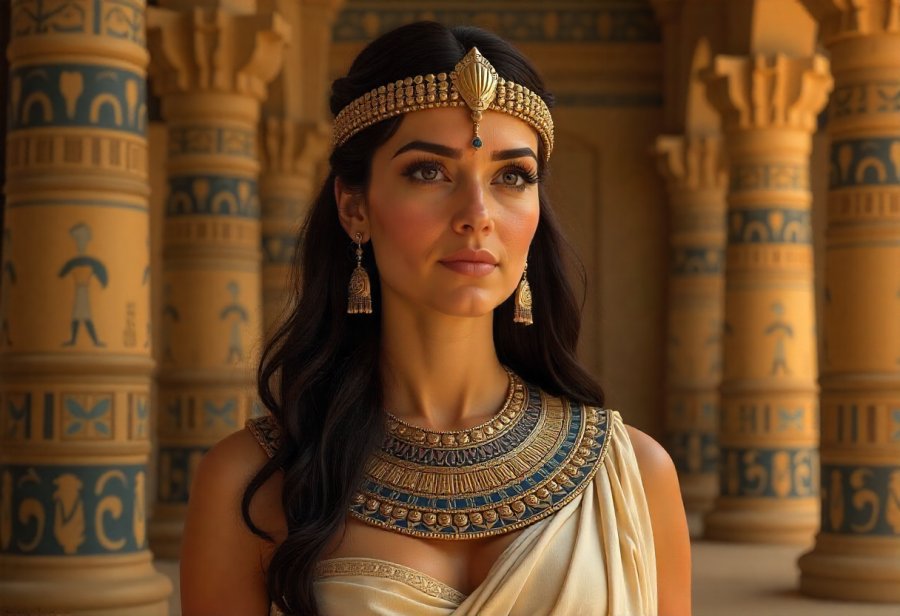Is Cleopatra VII remembered for her beauty or her brilliance? Far from the Hollywood glamour and romantic legends, she was a formidable scholar-queen whose true power lay in her intellect, diplomacy, and strategic mastery. Educated and multilingual, Cleopatra understood that influence came from knowledge, cultural diplomacy, and resilience—traits that enabled her to navigate Egypt’s turbulent political landscape amidst the rise of Rome. Her alliances with Julius Caesar and Mark Antony were calculated moves designed to protect her kingdom’s independence, not mere romantic entanglements. Cleopatra’s leadership exemplified adaptability, turning societal underestimations into advantages, and emphasizing that authentic authority stems from wisdom and strategic thinking. Her legacy challenges modern perceptions of power, illustrating that influence built on ideas, negotiation, and resilience endures beyond superficial appearances. Could her greatest strength be her mind? The story of Cleopatra reminds us that true power resides in intellectual mastery, shaping history and inspiring generations.

Unveiling Cleopatra: The Power of Her Mind Over Myth
Cleopatra VII is often remembered as one of history’s most iconic figures, but her true significance goes far beyond her glamorous image. As the last active ruler of Egypt’s Ptolemaic dynasty, she operated in a world filled with political upheaval, external threats, and internal rivalries. While stories tend to focus on her relationships with Julius Caesar and Mark Antony, her real power was rooted in her sharp mind, diplomatic skill, and strategic intelligence. Cleopatra was a highly educated ruler who mastered multiple languages, engaged in scholarly pursuits, and understood the nuances of power and diplomacy. Her leadership was driven not by superficial beauty but by her ability to combine knowledge with political savvy, making her a formidable force in a turbulent era.
Many people see Cleopatra as a seductress, but her legacy is built on much more than charm. She was a well-educated scholar with a deep understanding of her cultural and political landscape. Her ability to speak Egyptian, Greek, Latin, and other languages fluently allowed her to forge direct connections with diverse audiences and foreign leaders. Her scholarly pursuits included literature, philosophy, and sciences, which helped shape her reputation as a learned and wise ruler. This intellectual foundation gave her the confidence and insight needed to navigate the complex realm of international politics and internal governance, proving that her influence extended far beyond her appearance.
Her true power lay in her strategic thinking and her capacity to lead with calculated precision. Cleopatra knew when to make alliances and how to leverage them for Egypt’s benefit. Her diplomatic skills were especially evident in her relationships with Rome’s most influential men, Julius Caesar and Mark Antony. These partnerships weren’t based on romance or vanity—they were carefully crafted moves designed to preserve Egypt’s independence and strengthen her position. Cleopatra understood that in a world of shifting alliances, her greatest asset was her mind, and she used her intelligence to outmaneuver rivals and secure her kingdom’s future.
Her leadership style was marked by resilience and adaptability. In a society where female rulers were often underestimated, Cleopatra turned her gender into an advantage. She used her influence and intelligence to shape political outcomes, forging alliances with powerful men and asserting her authority through wit and strategic insight. Her ability to read her opponents and adapt her tactics kept her in control amid constant threats. Her decisions reflected a keen understanding of both internal politics and international power dynamics, reinforcing that her true strength was rooted in her intellect and her capacity to think critically under pressure.
Cleopatra’s legacy challenges us to rethink what it means to be powerful. While her beauty and romantic associations have captured the popular imagination, her influence was rooted in her leadership, intelligence, and political mastery. She demonstrated that influence and authority come from knowledge, diplomacy, and resilience—timeless qualities that continue to inspire. Her story shows that true power isn’t just about appearance or titles but about the ability to think strategically, adapt to change, and leverage knowledge for lasting impact. Cleopatra’s mind, more than her glamour, made her a queen whose influence endures through history.
Egypt’s Turbulent Era: Political and Cultural Currents Under Cleopatra’s Reign
During Cleopatra’s reign, Egypt was navigating a fragile and complex political landscape. Once a powerful and largely independent kingdom, Egypt’s sovereignty was increasingly threatened by Rome’s expanding influence across the Mediterranean. The Ptolemaic dynasty, established by Macedonian Greek generals following Alexander the Great’s empire fragmentation, ruled Egypt. By Cleopatra’s time, this ruling family faced constant struggles to maintain independence amid external pressures from Rome and internal rivalries that threatened stability. Her leadership required sharp strategic thinking to adapt swiftly to these shifting alliances and power dynamics.
Culturally, Egypt remained a vibrant hub of learning, innovation, and tradition, centered around Alexandria. Known for its legendary Library and scholarly community, Alexandria fostered a unique mix of Hellenistic and Egyptian customs. This environment deeply influenced Cleopatra’s worldview and approach to governance. Her education reflected this cultural richness, emphasizing languages, philosophy, and political science, which helped her communicate directly with diverse audiences and forge international alliances without relying solely on interpreters.
Internally, Egypt faced political factionalism, economic pressures, and the challenge of managing a diverse population with competing interests. Cleopatra inherited a delicate political situation, where her authority depended on balancing internal factions while defending Egypt against external threats. The rising power of Rome made her position even more precarious, compelling her to employ diplomacy, strategic marriages, and military strength—tools she wielded with keen insight and political finesse.
Her early education in the Hellenistic tradition equipped her with a deep understanding of court politics, military strategy, and cultural diplomacy. This background proved invaluable in navigating the treacherous waters of Mediterranean geopolitics. Her mastery of multiple languages and scholarly pursuits reinforced her reputation as a learned and wise ruler, capable of engaging directly with Egyptian traditions and Greek intellectual currents. This linguistic and cultural fluency was a strategic advantage in maintaining influence across diverse regions.
Throughout her reign, Cleopatra demonstrated an acute awareness of international power dynamics. She understood that Egypt’s survival depended on forming and maintaining alliances, especially with Rome’s most influential figures like Julius Caesar and Mark Antony. These partnerships were based on calculated diplomacy, not personal vanity. Cleopatra’s ability to leverage her knowledge, cultural capital, and political insight allowed her to secure her kingdom’s future amid shifting alliances and regional rivalries.
Her leadership was marked by resilience and adaptability. Facing constant threats, internal betrayals, and external invasions, she remained composed and resourceful. Every crisis became an opportunity to demonstrate her strategic thinking and resolve. By fostering Alexandria’s scholarly institutions and patronizing the city’s intellectual life, she reinforced her influence beyond military might and political alliances, recognizing that knowledge and culture could elevate her kingdom’s prestige and her own authority.
Cleopatra’s story is intertwined with the broader history of a region caught between tradition and empire. Her ability to sustain Egypt’s independence in such turbulent times highlights the importance of strategic foresight, cultural intelligence, and diplomatic finesse. Her leadership was a product of her environment, her education, and her innate capacity to adapt—making her not just a mythic figure of beauty, but a formidable strategist whose influence endures through history.

Strategic Genius: Cleopatra’s Leadership and Political Prowess
Cleopatra’s leadership was defined by her exceptional ability to think strategically and act with decisive purpose. She possessed a keen awareness of her political environment, quickly assessing threats and opportunities to craft policies that safeguarded Egypt’s independence and strengthened her position. Her decisions were rooted in a deep understanding of both internal power struggles and external diplomatic currents, allowing her to navigate complex alliances with remarkable finesse. Cleopatra’s mastery lay in balancing immediate needs with long-term stability, always staying several steps ahead of her rivals.
Despite societal skepticism about a female ruler, Cleopatra turned gender biases into an asset. She used her intelligence, wit, and diplomatic skill to forge vital alliances with influential figures like Julius Caesar and Mark Antony. These partnerships weren’t built on vanity or personal gain but on calculated moves designed to bolster Egypt’s sovereignty. Her ability to leverage her political insight and cultural capital transformed her into a formidable negotiator, shaping regional dynamics to her advantage.
Her relationships with these Roman leaders exemplify her political mastery. Cleopatra understood that influence in the ancient world often came through negotiation rather than brute force. Her alliance with Caesar helped solidify her throne amid internal rivalries, while her partnership with Antony aimed to defend Egypt from external threats and secure its future. She read her opponents with precision, adjusting her tactics to maintain the upper hand in shifting geopolitical landscapes.
Resilience was another core trait of her leadership. Cleopatra faced constant threats, betrayals, and invasions, yet remained composed and adaptable. Every crisis became an opportunity for her to demonstrate her strategic thinking and resolve. Whether defending her sovereignty or fostering Alexandria’s scholarly and cultural institutions, she consistently used knowledge and diplomacy to reinforce her influence.
Beyond politics, Cleopatra supported Alexandria’s vibrant intellectual scene, recognizing that knowledge and culture could elevate her kingdom’s stature. Patronizing the city’s libraries and scholarly communities, she understood that influence extended beyond military might. Investing in education and the arts was a deliberate strategy to strengthen her cultural authority and ensure her legacy endured through the power of ideas.
Throughout her reign, Cleopatra proved that true leadership stems from intellect, resilience, and strategic foresight. Her ability to read her environment, make shrewd decisions, and adapt swiftly kept her in control against overwhelming odds. Her legacy demonstrates that influence rooted in knowledge and diplomacy can shape history, offering timeless lessons on the power of the mind in leadership.
Redefining Influence: Cleopatra’s Enduring Legacy and Modern Perspectives
Cleopatra’s leadership continues to resonate today, especially in conversations about women’s roles in power and intelligence. Her example challenges outdated stereotypes that suggest influence and strategic thinking are reserved for men. Instead, Cleopatra exemplifies that true strength lies in wisdom, diplomatic skill, and resilience—qualities that transcend gender. Her legacy encourages us to broaden our understanding of what it means to be a powerful leader, emphasizing that intellect and strategic insight are just as vital as traditional markers of authority.
Modern leadership values adaptability and critical thinking, traits Cleopatra mastered effortlessly. She navigated a complex political landscape, forging alliances and making decisions based on careful analysis rather than superficial charm or emotion. Her ability to read opponents, adjust tactics, and maintain her kingdom’s independence offers lessons still relevant today. In an era that prizes flexibility and quick wit, Cleopatra’s example reminds us that genuine influence stems from strategic foresight and the capacity to adapt to change.
Her story also highlights how women have historically been underestimated in positions of power. Cleopatra turned this challenge into an advantage, using her intelligence and cultural knowledge to wield influence in a male-dominated world. Her mastery of diplomacy and ideas proved that leadership rooted in knowledge and cultural capital can break societal barriers and redefine what it means to be powerful. Today, many women in politics, business, and academia draw inspiration from her example, recognizing that influence is built on mastery of ideas, negotiation, and resilience.
Cleopatra’s patronage of Alexandria’s scholarly institutions underscores her recognition of education’s role in leadership. She understood that fostering knowledge and supporting intellectual pursuits could elevate her kingdom’s prestige and her own authority. This approach remains vital today, as innovation and learning continue to be key drivers of societal progress. Her example encourages modern leaders to invest in education and culture as foundations for sustainable influence and growth.
Looking through this modern lens, Cleopatra’s true legacy isn’t just romantic or glamorous; it’s a powerful testament to the strength of the mind. Her ability to think critically, communicate effectively, and adapt swiftly in turbulent times shows that authentic power resides within. Her life serves as a reminder that lasting influence comes from strategic insight, resilience, and intellect—traits that continue to define effective leadership across generations. Cleopatra’s story inspires us to value wisdom and adaptability as the true marks of leadership.

Beyond Beauty: The Lasting Power of Cleopatra’s Intellectual Mastery
Cleopatra’s legacy goes far beyond her image as a glamorous queen; it is fundamentally rooted in her extraordinary intellect and political mastery. Her ability to think strategically, navigate complex alliances, and remain resilient in a turbulent world set her apart as a ruler whose true power lay within her mind. Throughout her reign, Cleopatra demonstrated that influence is built on wisdom, diplomatic skill, and the capacity to adapt—qualities that transcend superficial appearances and societal expectations.
Her mastery of multiple languages, her scholarly pursuits, and her keen understanding of international politics allowed her to maintain Egypt’s independence amid rising external threats. Cleopatra knew that influence in the ancient world depended less on personal charm and more on the ability to think several steps ahead. Her decisions—crafted with precision and foresight—shaped regional dynamics and secured her kingdom’s future, proving that intellectual strength could be a formidable form of power.
Cleopatra’s story challenges the misconception that influence relies solely on beauty or personal allure. Instead, it highlights that leadership rooted in knowledge, resilience, and strategic insight endures beyond fleeting glamour. Her ability to read her opponents, adjust her tactics, and foster alliances based on mutual benefit underscores the importance of mental agility and cultural intelligence in effective leadership. Her legacy reminds us that true authority is often a reflection of the strength of the mind, not just the persona.
Her influence also redefines how we perceive women in power. Cleopatra turned societal underestimation into a strategic advantage, demonstrating that intelligence and diplomacy are powerful tools for shaping history. Her example continues to inspire women in politics, business, and academia, emphasizing that mastery of ideas, negotiation, and resilience can break barriers and reshape perceptions of leadership.
In the end, Cleopatra’s story invites us to reconsider what it means to be truly powerful. Her legacy underscores that the most enduring influence arises from a sharp mind—one capable of critical thinking, swift adaptation, and strategic vision. These qualities remain vital in today’s world, proving that genuine leadership is rooted in the strength of the intellect. Cleopatra’s life stands as a testament to the idea that the greatest power lies within the mind, shaping history and inspiring generations to come.